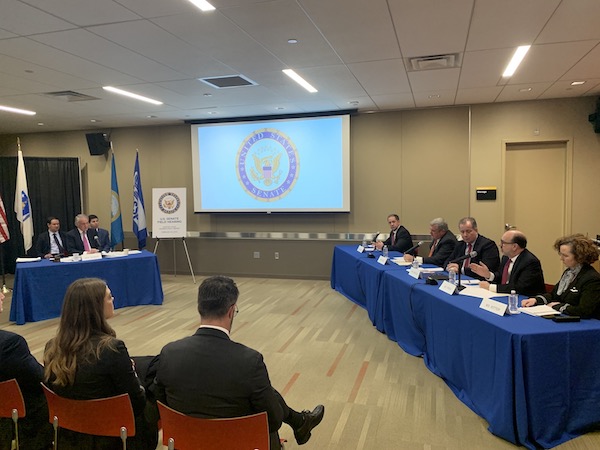The following is a media release from Sen. Ed Markey’s offices. He was elected by voters in the Commonwealth of Massachusetts to serve the state in Washington DC in the US Senate. He is a Democrat.
***
Boston – Senator Edward J. Markey (D-Mass.), Ranking Member of the Subcommittee on Security, today held a field hearing in Boston, Massachusetts titled “Promoting Safe Skies through Scanning and Screening: Oversight of Air Cargo Security.”
The hearing focused on the Transportation Security Administration’s (TSA) implementation of Senator Markey’s 100 percent scanning and screening mandate for all air cargo transported on passenger aircraft, as well as passenger and baggage screening systems, the danger that drones flying near airports pose to airplanes, and the cybersecurity of the nation’s increasingly computerized aviation system.
When Congress passed the Implementing Recommendations of the 9/11 Commission Act of 2007, Senator Markey overcame industry opposition and secured language that required the TSA establish a system to screen 100 percent of all air cargo transported on passenger aircraft by 2010.
The law additionally detailed the types of technologies and procedures that would provide sufficient security, including x-ray systems, explosives detection systems, explosives trace detection, explosives detection canine teams, physical searches, and any other system the TSA later certified.
[broadstreet zone=”51611″]
Overall, the TSA, the air cargo industry, airlines, security experts, consumer groups, flight attendants, and pilots all support the Certified Cargo Screening Program and testified that Senator Markey’s 100 scanning mandate has successfully enhanced aviation security through a commercially and logistically viable system.
The current challenges for air cargo screening transported on passenger aircraft revolve around how to improve the program at the margins and keep it up to date with advancing security technologies.
[broadstreet zone=”52093″]
“Prior to my law, almost all of the air cargo that we load onto passenger planes was not scanned for liquid, plastic, or conventional explosives,” said Senator Markey. “It was a glaring loophole in our aviation security system just waiting to be exploited, and I am proud to have closed it. But vigilance must be our watchword on aviation security. I will continue to fight to increase the use of scanners in both air cargo and passenger baggage security. We must continually assess the challenges we face in deploying the latest and greatest cargo screening technologies, as well as how TSA’s strained budget may be impacting its ability to oversee air cargo security. ‘Never forget’ is much more than a motto, it is a commitment to action.”
“TSA is grateful for the opportunity to participate in the hearing and highlight the Certified Cargo Screening Program,” said John Beckius, Executive Director, Air Cargo Division, Transportation Security Administration. “In our effort to raise the baseline for all elements of aviation security, this program is an important tool that helps address evolving threats while ensuring air cargo commerce remains both secure and efficient.”
[broadstreet zone=”58610″]
“The safety and security of our passengers and employees is our top priority at Massport and we are committed to address the security challenges of today and preparing for the threats of tomorrow,” said Ed Freni, Director of Aviation, Massport. “I want to thank Senator Markey for his leadership and ongoing commitment to innovation in aviation security. It is an honor for us to host this important hearing and discuss ways to further enhance security at our airports.”
“When Flight Attendants go to work, we do so trusting that every function of security is working up to the aircraft door,” said Sara Nelson, president of the Association of Flight Attendants-CWA, representing 50,000 Flight Attendants at 20 airlines. “We are aviation’s last line of defense. We need the proper tools, training, staffing, and communications to perform our work and thwart any onboard security threats. Senator Markey continues to keep his promise to ‘Never Forget’. He actively keeps that promise as the strongest champion for implementing all 9/11Commission recommendations and assessing evolving threats to mitigate risk.”
[broadstreet zone=”70107″]
“The Airforwarders Association appreciates the opportunity to have been invited to share our views on air cargo security and specifically our perspective on the Certified Cargo Screening Program,” said Brandon Fried, Executive Director of the Airforwarders Association. “The initiative plays a vital role in enlisting the supply chain to successfully solve the screening challenge. The forwarding community looks forward to working with the TSA in improving its internal communications and urges Congress to adequately fund the agency to meet the demands required to keep the aviation secure.”
“Analogic’s focused commitment and years of experience with CT technology has allowed us to bring to market the next generation in 3D X-ray imaging in the form of the ConneCT,” said Chief Technology Officer of Analogic Corporation, Steve Urchuk. “We and our industry partners welcome the opportunity to develop screening solutions that meet the needs of the aviation security community.”

Senator Markey’s specific efforts related to aviation security and cargo screening include:
- Securing language in the TSA Modernization Act of 2018 that instructed the TSA to implement a pilot program for deploying the latest-in-technology computed tomography (CT) scanners to screen passengers’ carry-on bags, as well as authorized a feasibility study and pilot program for using CT scanners to screen air cargo transported on passenger aircraft.
- Introducing the Funding for Aviation Screeners and Threat Elimination Restoration (FASTER) Act to bolster the TSA’s budget. The legislation would immediately eliminate the diversion of the 9/11 Security Fee, ensure that passenger security fees go solely towards security, and prevent Congress from raiding these funds in the future.
- Introducing for the past three Congresses the Drone Aircraft Privacy and Transparency Act, legislation that would ensure standards for informing the public about the location, timing and ownership of drones. Several provisions of this legislation were included in the FAA Reauthorization Act of 2018, including requiring drone operators to disclose if they collect personally identifiable information about an individual, how the personal data will be used, and when the sensitive information will be destroyed; ensuring that American’s have access to information regarding the location, purpose of flight, and technical capabilities of government drones; and improving the data minimization of government drones and encouraging privacy research at drone test sites.
- Introducing the Cybersecurity Standards for Aircraft to Improve Resilience (Cyber AIR) Act, which would require the airline industry to share information about cybersecurity vulnerabilities and direct the FAA to establish cybersecurity protections for aircraft.
- Authored provision in the FAA Reauthorization Act of 2018 that bans small knives on planes.

Senator Edward J. Markey (D-Mass.), Ranking Member; John Beckius, Executive Director, Air Cargo Division, Transportation Security Administration; Edward Freni, Director of Aviation, Massachusetts Port Authority; Brandon Fried, Executive Director, Airforwarders Association; AFL-CIO; Steve Urchuk, Chief Technology Officer, Analogic; Jennifer Ritter, Flight Attendant, United Airlines, on behalf of Association of Flight Attendants-CWA (photo courtesy)
